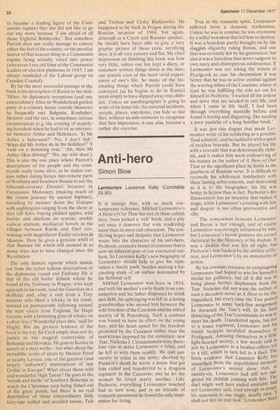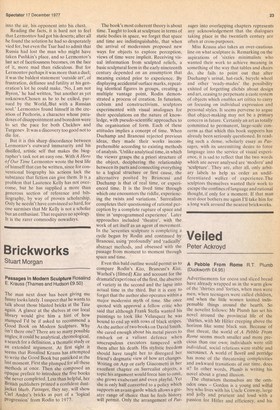Anti-hero
Simon Blow
Lermontov Laurence Kelly (Constable 26.50) It is strange that, with so much contemporary reference, Mikhail Lermontov's A Hero of Our Time has not, in these cultish days, been picked a 'cult' book, and a pity too since it deserves that wide readership more than do most cult obsessions. The conflicting hopes and despairs that Lermontov wrote into the character of his anti-hero, Pechorin, created a brand of cynicism that is now an inherent part of our emotional outlook. So Laurence Kelly's new biography of Lermontov should help to give his reputation a timely push, besides making a fascinating study of an author dominated by his fictional self.
Mikhail Lermontov was born in 1814, and with his mother's early death from consumption and his father disgraced by drink and debt, his upbringing was left to a doting grandmother who moved him between the wild freedom of the Caucasus and the stilted society of St Petersburg. Such a contrast was bound to have its effect on the young boy, and his heart opted for the freedom promised by the Caucasus rather than the restrictions imposed by the autocratic new Tsar, Nicholas I. Circumstances were therefore ripe to make Lermontov a rebel, and he fell in with them readily. He quit university to enlist in the army; shocked by Pushkin's death he wrote a poem that got him exiled and transferred to a dragoon regiment in the Caucasus; and he let the woman he loved marry another. Like Pechorin, everything Lermontov touched had to turn sour, and in an attitude of romantic pessimism he found the only inspiration for living. True to the romantic spirit, Lermontov suffered from a demonic restlessness. Unless he was in combat, he was overcome by a wilful boredom that led him to destroy. It was a boredom partly brought on by the sluggish oligarchy ruling Russia, and one that was certainly felt by his generation, but also it was a boredom that never outgrew its own nasty and obstreperous adolescence. It Lermontov was not taking the waters at Pyatigorsk to cure his rheumatism it was better that he was in active combat against the warring tribes of the Caucasus, where at least he was fulfilling the role set out for himself in Pechorin: 'I wasted all the ardour and drive that are needed in real life, and when I came to life itself, I had been through everything mentally before and found it boring and disgusting, like reading a poor pastiche of a long familiar book.'
It was just this disgust that made Lermontov write of his soldiering as a possible 'final solution', and he tackled it with a spirit of reckless bravado. But he played his life with .a bravado that was determinedly childish, and it makes him seem undeserving of his stature as the author of A Hero of Our Time or the significant place he holds in the pantheon of Russian verse. It is difficult to reconcile his adolescent tomfoolery with these lasting achievements, and distressing as it is to the biographer, his life was better in fiction than in fact. Pechorin's disillusionment has an intensity that makes it tragic, while Lermontov's jousting with fate and despair is too often provocative and silly.
The comparison between Lermontov and Byron is fair enough, and of course Lermontov was strongly influenced by him, but Lermontov's heroic gestures are turned theatrical by the flippancy of his disdain. It was a disdain that was felt all right, but Pechorin's was backed by the artifice of fic-: tion, and Lermontov's by an immaturity 01 action.
By his constant recourse to campaigning Lermontov had hoped to win for himself a medal for gallantry, but all it did was to bring about further displeasure from the Tsar. Nicholas did not want the author of such a decadent novel as A Hero to be distinguished, but every time the Tsar posted Lermontov to some back-line assignment he thwarted the Tsar's will. In his final thwarting of the Tsar's commands he was to meet his death. Transferred again, but nOt to a lesser regiment, Lermontov and his friend Stolypin Invalided themselves to Pyatigorsk. Amusing themselves in a little light-hearted society, a few words said jfl jest by Lermontov to a brother-officer led to a tiff, which in turn led to a duel. The fresh evidence that Laurence Kelly has unearthed from the unpublished memoirs of Lermontov's second show that, at twenty-six, Lermontov had still not outgrown his childish jousting with fate. The, duel might well have ended amicably /la° not Lermontov said, loud enough to toll?t his opponent to one single, deadly shot, I shall not fire on that fool.' Lermontov fired into the air, his opponent into his chest.
Reading the facts, it is hard not to feel that Lermontov had got his deserts; after all he found the solution he had so desperately vied for, but even the Tsar had to admit that Russia had lost the man who might have taken Pushkin's place, and so Lermontov's last act of facetiousness becomes, on the face of it, more mad than ridiculous. But for Lermontov perhaps it was more than a duel; it was the baldest statement 'outside art', of frustration, defiance and futility at his generation's lot he could make. 'No, I am not Byron,' he had written, 'but another as yet unknown/Chosen as he to be exiled, pursued by the World,/But with a Russian soul.' Lermontov found himself in the creation of Pechorin, a character whose paradoxes of disappointment and boredom were to set the pace for both Chekhov and Turgenev. It was a discovery too good not to die for.
But it is this sharp discordance between Lermontov's outward immaturity and his distilled, artistic self that makes the biographer's task not an easy one. With A Hero of Our Time Lermontov wrote the best life of himself that can be written, since for conventional biography his actions lack the substance that fiction can give them. It is a problem that Laurence Kelly has not overcome, but he has supplied a more than generous section of reference and bibliography, by way of proven scholarship. Only he needn't have convinced so hard, for one surmises that Mr Kelly is not a scholar but an enthusiast. That requires no apology. It is the rarer commodity nowadays.



































 Previous page
Previous page